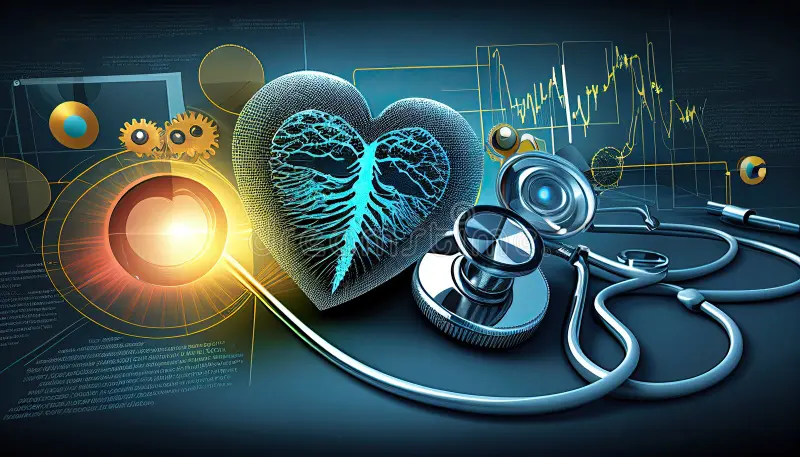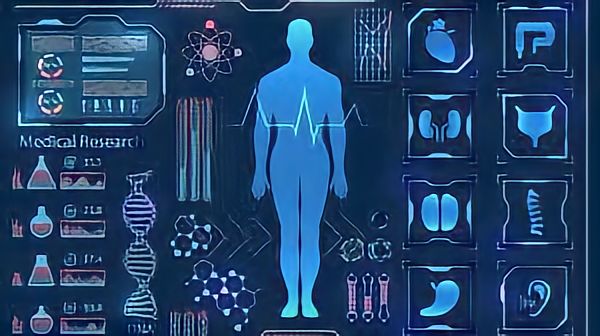Table of Contents
ToggleIntroduction (How Does AI Help in Healthcare)
Artificial intelligence (AI) is not just a futuristic concept but has already made its way into various industries like Business, Education, including healthcare. AI refers to the simulation of human intelligence in machines that are programmed to think and learn like humans or a profational doctor. When it comes to healthcare, AI is revolutionizing patient care in various ways those are surprising and unbelievable. Let’s delve into the concept “How does AI help in healthcare”.

Understanding How Does AI Help in Healthcare
Artificial intelligence encompasses a range of technologies that enable machines to perform tasks that typically require human intelligence. In the healthcare industry, AI is being used in many ways in the healthcare industry such as
- To identify diseases and provide accurate treatment.
- Any disease that a patient is likely to suffer in the future can also be predicted through AI in advance.
- AI is used to detect some diseases which common doctors do not understand.
- AI enables faster and more accurate diagnostics through advanced images and patterns recognition.
- It can analyze medical images such as X-rays, MRIs, and CT scans, etc and it can assist healthcare professionals in detecting abnormalities.
Being Fair and Honest with AI in Healthcare
Transparency and explainability are key factors in building trust with AI systems in healthcare. AI algorithms must be designed to provide understandable explanations for the decisions they make. Additionally, fairness and equity must be incorporated into AI systems to prevent any biases or discrimination. This requires careful attention to data selection and model training to ensure AI applications benefit all patients equally.

Technical Perspective
- AI, which is like really smart computer stuff, should make accurate predictions in this field.
- It should not be influenced by the biases and judgments that people might have.
- It’s expected to find biases that humans can miss generally.
Bias and Fairness Types
- Sometimes, the data used to teach AI can have biases from past.
- If some groups are not well-represented in the data, the predictions might be biased.
- Making AI models can also introduce biases, especially if sensitive things like gender or race are used.
Clinical Perspective
- Even though we use these fairness checks in AI for healthcare, there’s still a gap between AI makers and healthcare providers.
- Some fairness measures might not work well in healthcare because of real biological differences between people.
- Choosing fairness measures can be tough, and there’s a need to consider ethical perspectives for different situations.
Hurdles in Healthcare Fairness
- Some fairness checks may not fit well in healthcare because they assume things that might not happen in real life.
- The fairness checks can conflict, making it tricky to choose the right one.
- Checking fairness in groups might not always show if there’s a real problem, and we need to be careful about misinterpreting results.
- AI can also do some kinds of mistakes , so we should also be aware about this.
Methods to Avoid Bias
- At every step of making AI, from collecting data to training models, we should be aware of fairness.
- Sometimes, the data might not represent everyone well, so we might need to fix it.
- There are ways to adjust data and models to make sure AI is fair, but it’s a bit tricky or tough.
Fairness Metrics
- People use different measurement to check, if AI is fair. Focusing on treating everyone equally.
- Some check if the AI is fair for groups, while others look at individual fairness.
- These measures help make sure AI doesn’t treat people unfairly based on sensitive factors or things.
Enhancing Diagnostic Accuracy and Speed

One of the most significant contributions of AI in healthcare is its ability to enhance diagnostic accuracy and speed. This is especially evident in the field of medical imaging, where AI-powered algorithms have demonstrated remarkable improvements in detecting and diagnosing diseases. In this way we can easily understand How does AI help in healthcare
Deep Learning for Medical Imaging
Deep learning algorithms, a subset of AI, have shown immense potential in improving diagnostic precision in medical imaging. By analyzing vast amounts of medical images, AI systems can detect subtle patterns and anomalies that may elude human eyes. This not only enhances diagnostic accuracy but also enables early detection of diseases, leading to timely interventions and improved patient outcomes.
Improving Diagnostic Precision with AI
AI systems can analyze medical images, such as X-rays, CT scans, and MRIs, with incredible speed and accuracy. By leveraging deep learning techniques, these systems can identify minute details and abnormalities that might be overlooked by human radiologists. This helps in making more accurate diagnoses and ensures that patients receive appropriate treatment without delay.
Enhancing Workflow Productivity in Radiology
AI-powered algorithms can also assist radiologists in managing their workload more efficiently. By automating tasks like image triage, lesion detection, and measurement, AI systems can free up radiologists’ time, allowing them to focus on interpreting critical cases. This not only improves workflow productivity but also reduces turnaround times for reports and enhances patient care.
Early Detection of Diseases through AI Analysis
AI systems are capable of analyzing large volumes of patient data, including medical images, electronic health records, and genetic information, to identify patterns and risk factors associated with various diseases. By identifying high-risk individuals at an early stage, healthcare professionals can intervene promptly and potentially prevent the development of chronic conditions.
AI-powered Clinical Decision Support Systems

In addition to enhancing diagnostic accuracy, AI has the potential to optimize treatment plans and reduce medical errors through clinical decision support systems (CDSS).
Optimizing Treatment Plans using AI Algorithms
AI algorithms can analyze vast amounts of patient data, including medical records, lab results, and treatment guidelines, to recommend personalized treatment plans for individual patients. By taking into account factors such as comorbidities, genetic profiles, and medication interactions, AI can help healthcare professionals make more informed decisions and improve patient outcomes.
Reducing Medical Errors and Enhancing Patient Safety
Medical errors are a significant concern in healthcare, leading to adverse events and patient harm. AI-powered CDSS can flag potential errors, such as drug interactions or incorrect dosages, before they reach the patient, reducing the risk of harm. Furthermore, AI algorithms can continuously learn from real-time patient data, improving their accuracy and ability to predict adverse events.
AI-assisted Personalized Medicine
Personalized medicine aims to tailor treatments to individual patients based on their unique characteristics, such as genetic makeup, lifestyle, and preferences. AI plays a crucial role in enabling personalized medicine by analyzing large datasets and identifying specific treatment regimens that are most likely to benefit individual patients.
Summary
How does AI help in healthcare? AI is reshaping healthcare by enhancing diagnostics, predicting diseases, and optimizing treatment plans. Despite its benefits, ethical considerations like transparency and fairness are critical. Challenges include biases in data, making fairness checks complex. In healthcare, AI is significantly improving diagnostic accuracy and speed of treatments, particularly in medical imaging.
Deep learning algorithms analyze images, row data or reports of patent, detecting subtle details for early disease detection. Automation of tasks through AI enhances radiologists’ productivity and reduces errors in this field. Beyond diagnostics, AI analyzes patient data for personalized medicine, tailoring treatments based on individual characteristics. Clinical Decision Support Systems (CDSS) powered by AI optimize treatment plans, reduce errors, and contribute to overall patient safety that is most important.
FAQs
1. How does AI help in Healthcare?
AI, or artificial intelligence, has the potential to revolutionize healthcare in numerous ways. One prominent application is in diagnosis and treatment prediction. By analyzing vast amounts of medical data, AI algorithms can identify patterns that human doctors might miss. This enables earlier detection of diseases and more targeted treatment plans.
Additionally, AI can enhance medical imaging, helping radiologists identify abnormalities with higher accuracy. This technology can also streamline administrative tasks, such as managing electronic health records and coordinating appointments, improving efficiency and reducing the burden on healthcare professionals.(How does AI help in Healthcare)
2. What do patients think about AI in healthcare?
Opinions among patients regarding the use of AI in healthcare vary. Some individuals may express concern about losing the human touch in their interactions with healthcare providers. However, many patients recognize the potential benefits of AI in terms of improved accuracy, faster diagnosis, and more personalized treatments. The use of AI technologies can also lead to cost savings, which can translate into more affordable healthcare for patients. Overall, patients are gradually becoming more accepting of AI as they witness its positive impact on their health outcomes.(How does AI help in Healthcare)
3. What is the future scope of AI in healthcare?
The future of AI in healthcare is incredibly promising. As technology continues to advance, AI will likely play an even greater role in personalized medicine. AI algorithms can be trained to analyze genetic information, allowing for tailored treatment plans based on an individual’s unique genetic makeup. Additionally, the integration of AI with wearable devices and mobile health apps will enable real-time monitoring of patients’ health conditions, facilitating early intervention and prevention of diseases. With ongoing research and development, AI has the potential to transform healthcare delivery and drastically improve patient outcomes.(How does AI help in Healthcare)
4. Why is AI needed in healthcare?
AI is needed in healthcare due to its ability to augment human capabilities and address the challenges faced by the healthcare industry. With an aging population and increasing demand for healthcare services, AI can help bridge the gap between the growing patient population and the limited number of healthcare professionals. By automating tasks that do not require human expertise, AI can free up doctors’ and nurses’ time, allowing them to focus on more critical aspects of patient care. Moreover, AI can assist in accurate diagnosis, proactive disease prevention, and the development of personalized treatment plans, leading to improved healthcare efficiency and outcomes.(How does AI help in Healthcare)
5. Can AI replace doctors?
While AI possesses remarkable capabilities, it is unlikely to completely replace doctors. AI algorithms excel at analyzing immense amounts of data and identifying patterns, but they lack the human intuition and empathy that are crucial in patient care. Physicians possess a wealth of medical knowledge and possess the ability to make complex decisions based on a patient’s unique circumstances. However, AI can act as a valuable tool, supporting doctors in making informed decisions, reducing errors, and optimizing treatment plans. Ultimately, the collaboration between AI and human doctors is likely to yield the most promising results.(How does AI help in Healthcare)
6. Is AI good or bad for healthcare?
The impact of AI on healthcare is neither inherently good nor bad. Like any technology, its ethical and societal implications largely depend on how it is implemented and utilized. When used responsibly, AI has the potential to drastically improve healthcare outcomes, making diagnoses more accurate and treatments more personalized. However, there are concerns surrounding issues such as data privacy, algorithm biases, and the potential for job displacement. Efforts must be made to ensure AI technologies are developed and governed in an ethical manner, prioritizing patient well-being and advancing the overall quality of healthcare.(How does AI help in Healthcare)
7. Can AI replace nurses?
Similar to doctors, AI is unlikely to replace nurses entirely. Nurses’ roles involve not only clinical tasks but also emotional support, compassion, and patient education. These human elements are of paramount importance in healthcare interactions and cannot be effectively replicated by AI. Nevertheless, AI can assist nurses in various ways, such as automating routine tasks, providing real-time monitoring of patients’ vital signs, and delivering personalized patient care plans. This synergy between AI and nurses can enhance healthcare delivery, empowering nurses to focus their attention on the areas where their expertise is most needed.(How does AI help in Healthcare)
You Can Read Also This Articles 👇👇👇
The main objective of industrial robots
What are The uses of autonomous robots
What is the work of virtual assistant
What Are Two Successful Application Of AI In Business
Future of AI In Education System
How does AI help in healthcare
How to use machine learning in healthcare
How are autonomous vehicles testbed
How can Artificial intelligence be used in the world of education

I am an Engineer and Passionate Blogger, who loves to share Deep, purified and Latest Information about IT (Information Technology) sector. Read More….

Leave a Reply